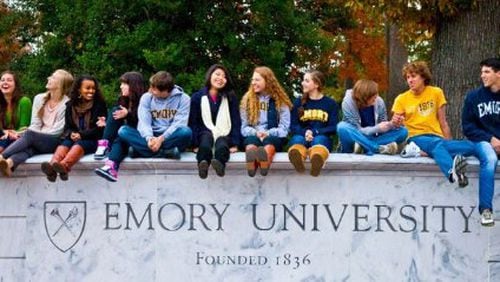In a column today, U.S. Marine Corps veteran J. Stephen McIntyre takes on state Rep. Earl Ehrhart and all those criticizing Emory University for its stand on behalf of undocumented students.
McIntyre recalls another effort by Georgia legislators to tell Emory officials who could attend their university; Georgia leaders warned Emory 56 years ago that it would lose its tax exemption if it admitted African-American students. So Emory sued the state. And won.
I asked McIntyre for a short bio. He responded: "I have lived in Atlanta for most of my life dating back to 1965. I am a proud father, American, reader of history, and UGA football fan. I do not work for Emory and do not have children who attended Emory. I wrote this commentary because I really care about Emory as a private institution. I am also a Methodist who knows a thing or two about Emory's commitment to Wesleyan values."
By J. Stephen McIntyre
Throughout the past two weeks, there has been a continuous stream of threats to Emory University regarding its review of options on how to protect and support DACA students (undocumented students who have received Deferred Action for Childhood Arrivals).
In interview after interview, individuals like state Rep. Earl Ehrhart, R-Powder Springs, have perpetuated allegations that Emory's support for DACA students is somehow subverting federal laws. These views suggest that Emory is somehow trying to paint itself as a rebel university.
Nothing could be further from the truth.
The requests by students, staff, faculty, and alumni — totaling more than 1,500 — did not demand Emory subvert federal immigration laws, but rather to make clear the university’s policies on compliance and collaboration with immigration authorities.
Emory, as a private university, does not have walls around its campus, nor does it allow any Tom, Dick, or Harry to enter its premises to do as they please. In their letter to Emory President Claire Sterk, petitioners asked that Emory follow the lead of sheriffs of Fulton and DeKalb counties.
Essentially, the demands were that the university remind Immigration and Customs Enforcement the university is not in the business of having its members turn against each other nor would it allow federal authorities a free hand in the day-to-day operations of the university. Rather, the demands were that Emory re-affirm its policy of inclusiveness and protection for all members of its community.
But, in recent weeks, critics who remain ignorant of the 2011 ICE directive that colleges/universities — like hospitals, funeral homes, and places of worship — remain off-limits for ICE interrogations and arrests seem steadfast on making the university an apparatus of the federal government.
When these critics launched their campaign of misinformation, they did so — almost exclusively — toward Emory. They ignored the counties in the Atlanta metropolitan area that have also opted to not willfully comply with the possibility of a federal crackdown on undocumented immigrants. They also ignored the role of the university itself, i.e., to create a space for higher learning that is free from intimidation.
Rep. Ehrhart's latest attempt at legislator bullying is nothing new. In the past, Rep. Ehrhart has targeted LGBT student groups, an art exhibit on AIDS, survivors of sexual assault, and racial/ethnic minorities. His threats to Emory, however, should shock any private business owner or any private citizen for that matter.
In efforts to again make the headlines, Rep. Ehrhart has sought to intervene on the matters of private institutions. He is claiming state legislators should decide which group of students should be allowed on Emory’s campus.
Sadly, we have heard this story before.
In the late 1950s, Emory University was the target of another group of state legislators who were angered by the possibility that a private university like Emory would allow African-Americans on its campus. At the time, Georgia law maintained that private institutions like Emory serve only one race.
In Emory’s case, the view from Georgia legislators was that it would serve only white students. Thus, an African-American attempting to pursue an education at Emory would thereby be in violation of state law — an “illegal” to borrow a word often used by Rep. Ehrhart. By admitting and supporting black students, Emory could thereby be held in contempt of Georgia law and could potentially lose its tax-exempt status.
But, in 1962, Emory administrators demonstrated real leadership when they filed a lawsuit against the tax commissioner of Georgia. The case, which was eventually decided in favor of Emory by the Georgia Supreme Court, marked a significant landmark in the ability of a private university to decide who they would allow on their campus.
Fifty years later, we hear the echoes of late 1950s and the early 1960s. If history — and common sense — teach us anything, it is this: The champions of government overreach and bigotry never win. They are disregarded as more individuals come to realize that universities — not fame-seeking politicians —should decide how to conduct the affairs of their campus.
I hope that in the near future, Emory defy bullying, assert itself as a strong institution of higher learning and not serve as a pawn in a strange political game.







